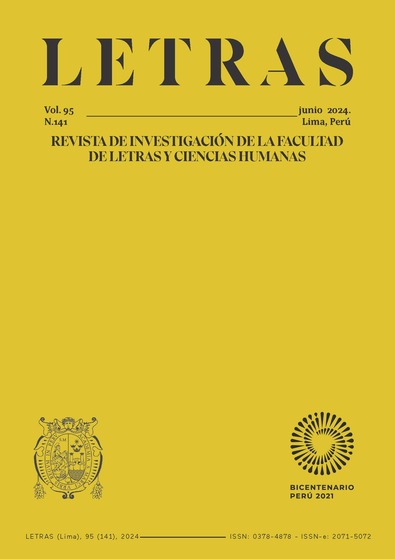Funcionamiento discursivo de la extrema derecha chilena en prensa y TikTok. Revisionismo histórico a 50 años del Golpe de Estado
DOI:
https://doi.org/10.30920/letras.95.141.18Resumen
El presente artículo analiza el funcionamiento discursivo utilizado por la extrema derecha en TikTok, apoyado en medios de prensa en línea, en el contexto del quincuagésimo aniversario del Golpe de Estado en Chile de 1973. La relevancia del hito político, sumado al contexto de conflictividad social chileno que ha permitido un paso al mainstreamde este espectro político durante y después del estallido social de 2019-2020, hacen necesaria una aproximación alternativa. Así, el objetivo de este trabajo es conocer la articulación discursiva, en tanto práctica y racionalidad política, de la extrema derecha chilena como un ejercicio de revisionismo histórico. El estudio considera 114 vídeos de TikTok relevantes publicados entre 2019 y 2023 y el apoyo de un corpus de más de 950 mil noticias de 77 medios digitales de Chile. Se utilizan métodos mixtos para analizar cuantitativamente la cobertura mediática y cualitativamente las estructuras narrativas mediante Análisis de Discurso basado en la Sociología del Conocimiento (ADSC). La contribución del texto es proponer una lectura que releve la autonomía política de este sector político, el cual se asume como una resistencia que se rebela contra un régimen de verdad en torno a lo sucedido en la época de la Unidad Popular. Finalmente, el presente texto contribuye a una discusión interdisciplinaria que considera métodos de minería de datos, análisis de discurso e integración de teorías sociológicas, psicológicas, políticas y filosóficas.Descargas
Citas
Barthes, R. (2006). El grado cero de la escritura. Siglo XXI.
Baudelaire, Ch. (1961). Obras (traducción, noticias históricas y notas de Nydia Lamarque). Aguilar.
Blanchot, M. (1992). El espacio literario. Paidós.
Bobes Naves, M. C. (1992). El silencio en la literatura. En C. Castilla del Pino, El silencio (pp. 99-123). Alianza Editorial.
Castilla del Pino, C. (1992). El silencio en el proceso comunicacional. En El silencio (pp. 79-97). Alianza Editorial.
Chirinos, E. (1998). La morada del silencio. Una reflexión sobre el silencio en la poesía a partir de las obras de Westphalen, Rojas, Orozco, Sologuren, Eielson y Pizarnik. Fondo de Cultura Económica.
Chirinos, E. (2016). El collar de Helena en el cuello de Sophia. Una lectura de Recinto de Javier Sologuren. En Abrir en prosa. Nueve ensayos sobre poesía hispanoamericana (pp. 95-115). M Visor Libros.
Eielson, J. E. (1998). Poesía escrita. Norma.
Eielson, J. E. (2004). La pasión según Sologuren. En L. Rebaza Soraluz (ed.), Arte poética (pp. 512-527). Pontificia Universidad Católica del Perú.
Gazzolo, A. M. (1991). Javier Sologuren: la poesía como ejercicio y como metáfora. Cuadernos Hispanoamericanos, 498, 7-34. https://www.cervantesvirtual.com/obra/cuadernos-hispanoamericanos--133/
Heraud, J. (2019). Al heroico modo. Ejercicios tempranos (1954-1959) (selección y notas de Rodrigo Vera). Casa de la Literatura Peruana.
Hernández, L. (1978). Vox horrísona. Ames.
Oquendo de Amat, C. (1927). Cinco metros de poema. Minerva.
Paz, O. (1998). El arco y la lira. El poema. La revelación poética. Poesía e historia. Fondo de Cultura Económica.
Pozuelo Yvancos, J. M. (1994). Teoría del lenguaje literario. Cátedra.
Ramírez González, J. L. (1992). El significado del silencio y el silencio del significado. En C. Castilla del Pino, El silencio (pp. 15-45). Alianza Editorial.
Silva-Santisteban, R. (2014). Vida continua de Javier Sologuren. En J. Sologuren, Vida continua (pp. 7-17). Academia Peruana de la Lengua.
Sologuren, J. (1980). Folios del enamorado y la muerte. Caracas: Monte Ávila Editores.
Sologuren, J. (2005). Obras completas. Tomo X, Hojas de herbolario. Pontificia Universidad Católica del Perú.
Sologuren, J. (2014). Vida continua. Academia Peruana de la Lengua.
Publicado
Cómo citar
Número
Sección
Este obra está bajo una licencia de Creative Commons Reconocimiento 4.0 Internacional




